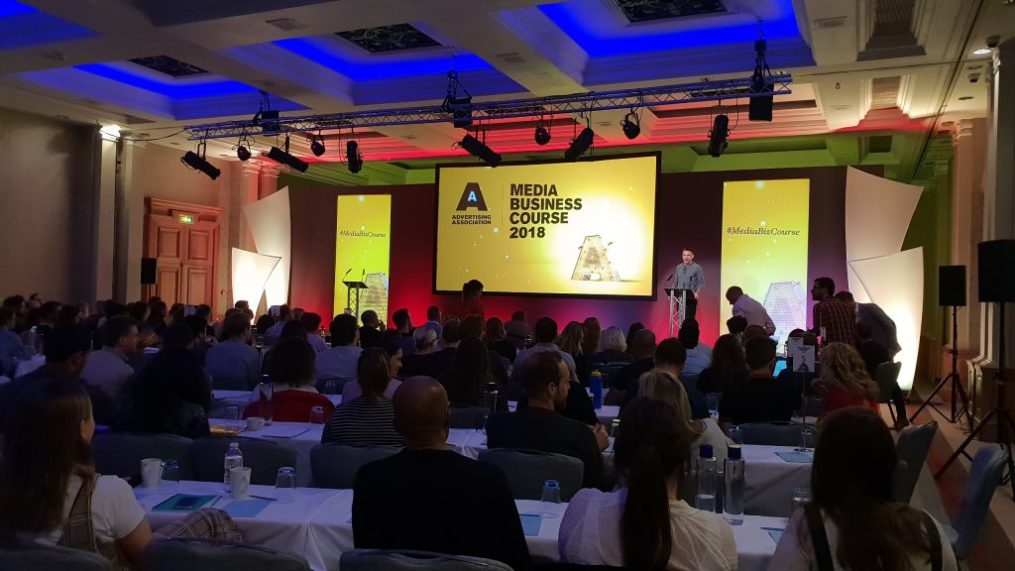Already a member? Sign in below

Each year the Advertising Association’s Media Business Course takes place in Brighton. Intended to offer young and upcoming talent in the advertising and marketing industry access to mentorship and lessons from key industry figures, the 2018 course was an enormous success, with 120 delegates representing the brightest rising stars in the industry. Over the course of the four days, the delegates are divided into syndicates and given a blue-chip client brief, which they have to deliver under the guidance of an industry veteran.
Its second day, on the topic of ‘Changing The Media Landscape’, featured speakers from some of the biggest media owners in the UK today.
Changing external trends
ITV’s Simon Daglish believes that advertising is in effect the business of creating narratives that resonate with an audience, saying:
“Emotions are potentially the most powerful marketing tool… the way you change behaviour is to emotionally engage with people. Every single study you’ll read anywhere in the world will see that emotion is a far greater driver of profitability than any other form. TV is for everyone and it does two things – it has huge reach, and it connects emotionally with your audience.”
Hearst UK’s Jane Wolfson pointed out that print offers a respite from an increasingly digital world, which puts consumers in a particularly receptive frame of mind for advertisers. It’s a message that’s been the basis for much marketing material on behalf of print publishers, but seems to be borne out by the continued success of magazines which make that experience a central tenet of their appeal. Wolfson said:
“The fact is that every channel is effective, and magazines are effective too. Actually the way we’re evolving as businesses is driving this forward. This might surprise some of you this is from PAMco, the UK magazine audience is 35 million. When you read a magazine you are focused on the subject. Reading a magazine drives an 88% uplift in wellbeing.”
Another key theme was of the proliferation of different consumer behaviours, all of which offer marketers new outlets to reach audiences. As numerous panelists mentioned, while each medium offers its own advantages, the fact that advertising spending consistently increases [link to latest Warc results] is testament to the fact that each works and is effective in its own way.
Such is the collaborative nature of the course that two social media giants were happy to appear on stage together: David Wilding of Twitter UK notes that while social media is often thought of as an ephemeral medium, because of the amount of time people spend on it it is actually a great opportunity for long-term brand building:
“Let’s not lose sight of all the incredible ways in which [social media] has transformed our lives.”
Similarly, Facebook’s Ian Edwards stressed that good advertising messages work just as well on social as on any medium, using Nike’s ‘Believe in Something’ campaign as an idea. “If you saw this outside the US, almost certainly you saw this on social media channels.”
“Social media is with you throughout your whole day. I think the one piece of advice I would give you is not to think about a ‘social media strategy’ – you need a communications strategy.”
While advertising on social offers those cross-border advantages, the Guardian’s Nick Hewat was quick to point out that newsbrands extend far beyond their native medium of print, offering some unique advantages as they do so:
“Newsbrand have something nearly all brands would kill for; where you get your news from tells people an awful lot about you. They help to define you. You can either shore up your beliefs or get them tested. It’s a common fallacy that newsbrands are dying. Actually we’ve never had bigger audiences; as Les Burnett says, reach is more important than targeting.”
Changing internal trends
However, in order to be truly effective, advertising needs to be representative of the audiences it reaches. Mark Creighton urged the attendees to look beyond the narrow bounds of the current industry in order to achieve that: “Homogenous behaviours are the reason we don’t include people. Please go out beyond the world of media and advertising, and take everything you can from that.”
Karen Blackett’s session exhorted the attendees to be ‘agents of change’ within an industry that frequently needs dragging into the modern world: “I had to think about how i could carve my way in an industry [where]… you have to do it in your way, you have to do you.”
She mentioned the Deloitte study that resulted in the term ‘covering’, which found that 61% of people cover to fit in with the wider industry. “You get the best thinking when you strive for diversity”.
Ultimately, the lesson from the second day was that the media landscape is constantly evolving as consumer habits change. If today’s up and coming marketers want to be successful in communicating emotion and narrative to those consumers, they need to be constantly evolving as well.
For more information on the MBC or to sign-up for next year, please visit our MBC page or email William Wade-Mills.
Already a member? Sign in below
If your company is already a member, register your email address now to be able to access our exclusive member-only content.
If your company would like to become a member, please visit our Front Foot page for more details.
Enter your email address to receive a link to reset your password
Your password needs to be at least seven characters. Mixing upper and lower case, numbers and symbols like ! " ? $ % ^ & ) will make it stronger.
If your company is already a member, register your account now to be able to access our exclusive member-only content.